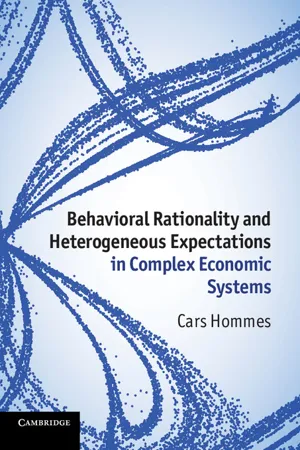
Behavioral Rationality and Heterogeneous Expectations in Complex Economic Systems
- English
- PDF
- Available on iOS & Android
Behavioral Rationality and Heterogeneous Expectations in Complex Economic Systems
About this book
Recognising that the economy is a complex system with boundedly rational interacting agents, the book presents a theory of behavioral rationality and heterogeneous expectations in complex economic systems and confronts the nonlinear dynamic models with empirical stylized facts and laboratory experiments. The complexity modeling paradigm has been strongly advocated since the late 1980s by some economists and by multidisciplinary scientists from various fields, such as physics, computer science and biology. More recently the complexity view has also drawn the attention of policy makers, who are faced with complex phenomena, irregular fluctuations and sudden, unpredictable market transitions. The complexity tools - bifurcations, chaos, multiple equilibria - discussed in this book will help students, researchers and policy makers to build more realistic behavioral models with heterogeneous expectations to describe financial market movements and macro-economic fluctuations, in order to better manage crises in a complex global economy.
Frequently asked questions
- Essential is ideal for learners and professionals who enjoy exploring a wide range of subjects. Access the Essential Library with 800,000+ trusted titles and best-sellers across business, personal growth, and the humanities. Includes unlimited reading time and Standard Read Aloud voice.
- Complete: Perfect for advanced learners and researchers needing full, unrestricted access. Unlock 1.4M+ books across hundreds of subjects, including academic and specialized titles. The Complete Plan also includes advanced features like Premium Read Aloud and Research Assistant.
Please note we cannot support devices running on iOS 13 and Android 7 or earlier. Learn more about using the app.
Information
Table of contents
- Cover
- Behavioral Rationality and Heterogeneous Expectations in Complex Economic Systems
- Title
- copyright
- Dedication
- Contents
- Figures
- Preface
- 1 Introduction
- 2 Bifurcations and chaos in 1-D systems
- 3 Bifurcations and strange attractors in 2-D systems
- 4 The nonlinear cobweb model
- 5 The cobweb model with heterogeneous expectations
- 6 An asset pricing model with heterogeneous beliefs
- 7 Empirical validation
- 8 Laboratory experiments
- Bibliography
- Index